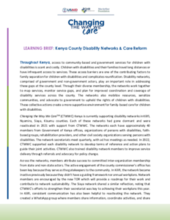Throughout Kenya, access to community-based and government services for children with disabilities is scant and costly. Children with disabilities and their families travel long distances or have infrequent access to services. These access barriers are one of the contributing factors to family separation for children with disabilities and complicates reunification.
Disability networks, comprised of government and non-government actors, play an important role in addressing these gaps at the county level. The networks also mobilize resources, sensitize communities, and advocate to government to uphold the rights of children with disabilities. These collective actions create a more supportive environment for family-based care for children with disabilities.
Practitioner Profile:
Related:
- Learning Brief: Family-Based Alternative Care
- Learning Brief: Disability Inclusion in Care Reform
- Learning Brief: Participation of People with Lived Experience
- Learning Brief: Transition of Care Services
- Learning Brief: Using Data to Inform National Strategy
- Learning Brief: The Importance of Integrating Family Strengthening, Reunification, Case Management and Workforce Strengthening
- Learning Brief: Influencing How Governments Care for Children in Moldova and Guatemala
- Learning Brief: Reflections on Faith Engagement Within Care Reform
- Care System Assessments Learning Brief

